Read Reviews
The Best Orbital Sanders
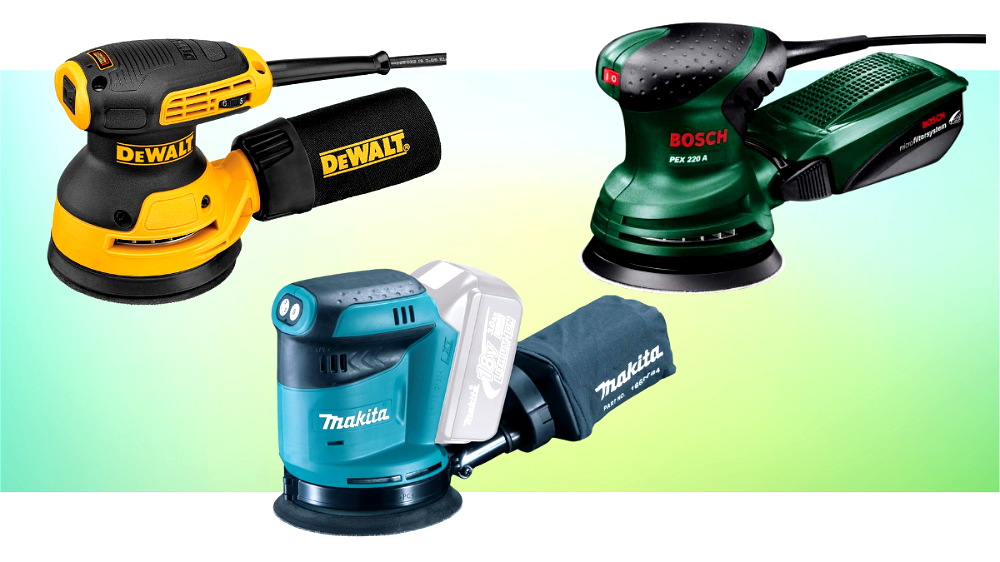
-
Best cordless orbital sander - Makita DBO180Z 18V Random Orbital Sander
-
Best for dust collection - Bosch PEX220A Random Orbital Sander
-
Best for professionals - DeWalt DWE6423 Random Orbital Sander
-
Best light weight sander - Makita BO5031/2 125mm Random Orbital Sander
-
Best for low noise levels - Bosch AdvancedOrbit 18 Cordless Orbital Sander
-
Best no-frills orbital sander - Jellas Orbital Sander Machine
-
Best value for money - Ryobi R18ROS-0 ONE+ Random Orbital Sander
-
Best for versatile grip - VonHaus 125mm Random Orbital Sander
Orbital Sander Reviews
1. Makita DBO180Z 18V Random Orbital Sander
Best cordless orbital sander
- Makita build quality in a portable, cable free package.
- A cordless sander that's easy to use, with intuitive controls that won’t get clogged up with dust.
- Effective dust removal. The bag actually fills up with dust!
- With a large 2.8 orbit diameter, there’s less chance of “swirl” coming up on the finished surface.
- Compared with the Bosch AdvancedOrbit 18, having just three sanding speeds is a bit disappointing.
- Some users have complained about a lack of power from this sander.
- It’s quite bulky for a one-handed orbit sander. If you’ve got small hands you might struggle.
- Type
- Cordless
- Power
- Battery - 18V
- Orbits/Revs
- 7,000-11,000 opm
- Variable Speeds
- 3
- Pad Diameter
- 125mm
- Orbit Diameter
- 2.8mm
- Power Cable
- n/a
- Weight
- 1.7kg inc batt
- Sanding Sheets
- 1
- Build Quality
- 5
- Performance
- 4
- Ease of Use
- 5
- Value for Money
- 4
Whether you’re a professional builder or a weekend DIYer, the name Makita is hard to miss. The Japanese tool masters have created a huge range of high-quality, innovative products, and the DBO180Z random orbital sander is a welcome addition to the brand.
Taking advantage of Makita’s excellent Lithium-ion Extreme Technology (LXT), they’ve put the power of 18V AC into a lightweight and sturdy little frame. This cordless sander is a bit heavier compared to the cordless DeWalt DCW210N-XJ. But it’s still incredibly easy to handle thanks to the clever grip shape and balance that allows for precision control.
The controls are well-positioned on the top of the orbital sander. There are just two soft buttons that control the three variable speeds and power off. It’s not got quite the sanding speeds compared to some cordless sanders though. However, 7,000, 9,500 and 11,000 opm are ideal for most sanding jobs.
The build quality on this random orbital sander is what you’d expect from one of the best names in the business. It’s built to last a long time, it’s not too loud during operation and the vibrations have been kept to a happy minimum. It’s easily one of the best random orbital sanders around. And if you’ve already invested in 18V batteries for other Makita cordless tools, this “naked” orbital sander is just the thing.
Did you find this review helpful?
2. Bosch PEX220A Random Orbital Sander[ SAVE 21% ]
Best for dust collection
- The front mounted on/off switch is ideally placed for one-handed operation.
- Bosch have worked hard to make the dust filter work. It does a good job at keeping even fine particles out of the air.
- Bosch include three different grit sanding discs to get you started.
- The grip shape is comfortable to hold and won’t slip easily.
- Not being able to hook up the dust port to a regular shop vac is really annoying. It’s a poor design choice.
- I’d like this orbital sander more if it had a variable speed control. It’s a necessary feature if you want to work on plastics or other meltable surfaces.
- The 220 Watt motor feels a bit underpowered compared to the powerful DeWalt DWE6423.
- Even though the filter does do a good job, it’s small. It gets filled up quickly and requires cleaning out often.
- Type
- Corded
- Power
- Mains - 220W
- Orbits/Revs
- 24,000 opm
- Variable Speeds
- 0
- Pad Diameter
- 125mm
- Orbit Diameter
- 1.25mm
- Power Cable
- 2.5m
- Weight
- 1.4kg
- Sanding Sheets
- 1
- Build Quality
- 4
- Performance
- 5
- Ease of Use
- 4
- Value for Money
- 5
If you’ve got any interest in DIY at all, you’ll know about Bosch. The German tool titans have been making some of the best orbital sanders, drills, and saws for more than 130 years. The PEX 220A random orbital sander is part of Bosch’s “green” line of DIY level tools. And you can pick up this excellent orbital sander from one of the best names for a bargain price.
The all-important part of an orbital sander is the grip, and you can tell Bosch have thought hard about ergonomics here. This Bosch sander is nice to hold, and the rubberised overmoulding is in all the right places for grip and vibration dampening.
The 220 Watt motor isn’t quite as meaty as the Makita, but it still spins the 125 mm sanding pad up to 24,000 opm. Not bad for an orbital sander that’s less than half the price. It is a single-speed power sander though, which might put some off, but it’s a good all-round speed for sanding. At 1.2 kg, it competes with the best random orbit sanders on the list and takes the standard hook-and-loop sanding pads you can find just about anywhere.
Now onto the feature that sets the PEX 220 apart from the competition – the dust filter. Rather than opting for a simple bag that fills with dust, Bosch have gone a step further. They’ve invented a very efficient dust collection box with internal filters. Unfortunately, it has a rectangular port shape that won’t fit external dust extraction systems.
Did you find this review helpful?
3. DeWalt DWE6423 Random Orbital Sander[ SAVE 25% ]
Best for professionals
- The 280 Watt motor makes this a seriously powerful orbital sander. It won’t slow down, even on big jobs.
- The six variable sanding speeds offer unrivalled control compared to the Ryobi R18ROS-0, for example.
- A 2.5 metre long power cable is ideal for most shop work. It’s long enough to not always need an extension.
- Never underestimate the importance of low vibration in power tools. The DWE6423 is mercifully kind to your hands and arms.
- Don’t push too hard when sanding. If the hook and loop fixings heat up too much they can deform and stop working.
- Even though the AirLock dust collection system is great, the connector size doesn’t fit many domestic vacuums.
- DeWalt haven’t included much in the way of accessories. There’s only one sanding sheet to get you started.
- Type
- Corded
- Power
- Mains - 280W
- Orbits/Revs
- 8,000-12,000 opm
- Variable Speeds
- 6
- Pad Diameter
- 125mm
- Orbit Diameter
- 2.6mm
- Power Cable
- 2.5m
- Weight
- 1.3kg
- Sanding Sheets
- 1
- Build Quality
- 5
- Performance
- 4
- Ease of Use
- 5
- Value for Money
- 3
The best orbital sander for professionals is the excellent DeWalt DWE6423. The comfortable grip, lack of vibration and dust collection bag work together to make this one of the best orbital sanders around.
One of the best-known power tool manufacturers around, DeWalt’s yellow pieces of kit are found on building sites and workshops around the world.
The 280 Watt variable speed motor spins up the 125 mm sanding pad to 8,000-12,000 orbits per minute (opm). This powerful orbital sander makes short work of sanding jobs and preparing surfaces for painting. Weighing in at less than 1.3 kg, it’s easy to handle but still feels good and solid.
The best thing about this orbital sander is the grip. The rubber overmoulding has been cleverly designed to fit your hand and reduce vibration as much as possible. This is a vital feature that turns an ordinary orbital sander into one of the best I’ve had a chance to test out.
The dust extraction port can be hooked up to your shop vac, but if you don’t choose this option then the included AirLock dust bag works a charm. Unlike cheap imitations, the dust collection system really works, and the dust bag holds plenty before it needs emptying.
Did you find this review helpful?
4. Makita BO5031/2 125mm Random Orbital Sander[ SAVE 16% ]
Best light weight sander
- Another capable and lightweight random orbital sander from Makita. Simple to use, the controls are intuitive and ideal for one-handed use.
- I’m a big fan of the Makita grip shape. Compared to the blocky Bosch AdvancedOrbit 18 it’s supremely comfortable.
- Seeing as random orbital sanders kick up a lot of dust, the covered on/off switch is a great little feature.
- The 3 metre power cable is incredibly generous. Compared to the VonHaus’s measly 2 metre one, it’s brilliant. You won’t need an extension unless the job is a huge one.
- If you’re looking for the best cheap random orbital sander, this isn’t it. You could buy two Jellas orbital sanders for the same price, and still get change.
- Makita only throw in one sanding disc, and there’s no case to store it in. It’s a shame because Makita make great cases!
- It’s a powerful random orbital sander, but the maximum opm of 12,000 is a bit low. I prefer to use higher sanding speeds on polishing jobs.
- Type
- Corded
- Power
- Mains - 300W
- Orbits/Revs
- 4,000-12,000 opm
- Variable Speeds
- 5
- Pad Diameter
- 125mm
- Orbit Diameter
- 2.8mm
- Power Cable
- 3m
- Weight
- 1.3kg
- Sanding Sheets
- 1
- Build Quality
- 5
- Performance
- 4
- Ease of Use
- 5
- Value for Money
- 4
The Makita BO5031 is one of the best random orbit sanders from one of the world’s favourite Japanese tool brands.
Boasting an intelligent electronic constant speed control, the powerful 300 Watt motor powers the 125 mm pad up to 4,000 – 12,000 opm. This impressive range of speeds makes this orbital sander ideal for all sorts of tasks. This sander has the muscle to tackle any sanding job you throw its way.
I’ve always liked the build quality of Makita tools, and the BO5031 doesn’t let them down. At 1.3 kg, the orbital sander weighs enough to feel sturdy but not so much that it’ll tire you out quickly.
Another handy feature is the placement of the variable speed control wheel – with a little practice, you can change speed with your thumb during operation and avoid melting plastics when sanding them down.
The dust collection bag is small, but it works well enough to keep most of the dust from getting into the air. This is a well-built and powerful random orbital sander that will last for years if you treat it well.
Did you find this review helpful?
5. Bosch AdvancedOrbit 18 Cordless Orbital Sander
Best for low noise levels
- If you like using two hands for sanding jobs, the front handle is a great addition.
- The max sanding speed of 24,000 opm is formidable. It’s fast enough to deal with any size job.
- This orbital sander is not just fast but having five selectable speeds makes it versatile too.
- The battery life indicator is large and easy to read. It’s good to know how much charge you’ve got left.
- This is an incredibly quiet orbital sander. So quiet that you might forget it’s on!
- Having to choose between a 6.0 Ah battery or the dust filter is a compromise I don’t like. It seems like poor design to me.
- The orbital sander is quite bulky, and a little bit heavy compared to the streamlined Ryobi R18ROS-0.
- Some users have complained that you don’t get much mileage from low Ah batteries. Expect less than 30 minutes with a 1.5 Ah battery.
- It’s called an AdvancedOrbit, but you only get a 1.6 mm orbit diameter. Compared to the whopping 2.8 mm from the Makita BO5031/2, you might get some swirl marks.
- Type
- Cordless
- Power
- Battery - 18V
- Orbits/Revs
- 6,000-24,000 opm
- Variable Speeds
- 5
- Pad Diameter
- 125mm
- Orbit Diameter
- 1.6mm
- Power Cable
- n/a
- Weight
- 1.9kg inc batt
- Sanding Sheets
- 0
- Build Quality
- 4
- Performance
- 5
- Ease of Use
- 4
- Value for Money
- 4
One of the biggest tool brands around, Germany’s Bosch have been producing quality professional and DIY-level tools for well over 100 years. The AdvancedOrbit 18 makes up part of Bosch’s “green” line of DIY tools. It has several features that make it one of the best budget random orbital sanders I’ve tried out so far.
The first thing you’ll notice about this orbital sander is the big front handle. At only 1.4 kg it’s not there to deal with extra weight, but it works well if you want to use another hand to keep things rock steady. I’m not convinced it’s necessary to be honest though.
Using Bosch’s Power For All system, you can plug in a range of different batteries. But you’ll have to get rid of the dust collection box if you want to fit a 6.0 Ah battery. The variable speed control powers up the orbital sander to a respectable 6,000 – 24,000 opm, and the previously mentioned filtered air box does a reasonable job.
Did you find this review helpful?
6. Jellas Orbital Sander Machine[ SAVE 19% ]
Best no-frills orbital sander
- A solid, no-frills orbital sander that’s ideal for home DIYers. Why spend the extra money when you don’t need to?
- A surprisingly comfortable grip shape. The rubberised top fits neatly in my hand and allows for easy control.
- The on/off switch is in my favourite spot. Right in front of the grip where your finger rests. It’s got a useful dust cover as well.
- With 12 sanding pads included, it’ll be a while before you need to buy more!
- Jellas haven’t skimped on the power cord length. 3 metres is the ideal length compared to some of the more expensive orbital sanders on my list.
- 13,000 max opm is a bit on the slow side. It could do with running a bit faster.
- Some users have complained that the dust bag doesn’t stay on during use.
- There have been a few reports of unreliable orbital sanders that break after light use. The quality control process might not compare well to brands like DeWalt or Makita.
- Type
- Corded
- Power
- Mains - 280W
- Orbits/Revs
- 8,000-13,000 opm
- Variable Speeds
- 6
- Pad Diameter
- 125mm
- Orbit Diameter
- not specified
- Power Cable
- 3m
- Weight
- 1.4kg
- Sanding Sheets
- 12
- Build Quality
- 4
- Performance
- 4
- Ease of Use
- 3
- Value for Money
- 4
Another decent budget orbital sander, the Jellas isn’t the best orbital sander in the world, but for the price, you can’t really complain. For the money you get six variable speeds and a comfortable overmoulded rubber grip that stretches back across the orbital sander for extra comfort.
The 240 Watt motor powers up the orbital sander to an adequate 13,000 opm and controls the surprisingly strong dust suction when in use. The grip isn’t difficult to hang on to, but you must make sure you don’t cover the exhaust vents with your palm to avoid overheating.
The three-metre cable is a welcome feature on this orbital sander, as are the 12 included sanding pads. It’s not the quietest sander and there’s a fair amount of vibration. But when you factor in the cost, it’s a DIY-level sander that’s not designed to be run for extremely long periods of time.
Did you find this review helpful?
7. Ryobi R18ROS-0 ONE+ Random Orbital Sander
Best value for money
- If you’ve already bought into the ONE+ battery system, this is an affordable addition to your tool collection.
- Ryobi’s patented GripZone rubber handle is seriously comfortable. As you’d guess, it gives great grip! And it’s well shaped to fit into even small hands.
- Even though there’s more plastic in the construction compared to the Makita DBO180Z, it’s sturdily made. Unless you’re really rough on it, it’ll last for years.
- Even with the battery included, this little beast weighs just 1.6 kg. That’s seriously light, compared to the other orbital sanders on my list.
- The battery life isn’t great unless you splash out on a larger 5 or 6 Ah battery. This will increase the weight dramatically though.
- The three included sanding sheets aren’t great. You should upgrade them for high performance.
- The dust extractor works, but it’s a pain to empty it fully. The dust gets trapped in the fibres and won’t work loose.
- The single sanding speed lets this orbital sander down, in comparison to the awesome range on the DeWalt DWE6423.
- Type
- Cordless
- Power
- Battery - 18V
- Orbits/Revs
- 22,000 opm
- Variable Speeds
- 0
- Pad Diameter
- 125mm
- Orbit Diameter
- 2.4mm
- Power Cable
- n/a
- Weight
- 1.6kg inc batt
- Sanding Sheets
- 3
- Build Quality
- 5
- Performance
- 4
- Ease of Use
- 4
- Value for Money
- 4
Another big name in Japanese tools, Ryobi is aimed squarely at the DIY market. Their ONE+ system of battery sharing means everything from your lawnmower to your air compressor runs on just one battery type.
In terms of build quality, the Ryobi R18ROS-0 might not compare with sanders like the DeWalt DWE6423. This Ryobi orbital sander definitely feels like more of a plastic tool, but it’s solid and should last for ages. The rubber grips have a pleasant texture to them, and they work quite well at keeping the vibrations down.
Power-wise, the sanding head spins at a fixed speed of 22,000 opm. It’s a decent, fast rate but for the price, you don’t get the luxury of variable speed control. Without a battery installed, the weight is kept down to just 1.1 kg and the little dust bag doesn’t get in the way and appears to do its job.
For Ryobi fans, this is one of the best orbital sanders around. They even include three different grit pads to get you going. Just make sure you’ve got a higher Amp-hour battery to hand if you want to sand for more than a few minutes.
Did you find this review helpful?
8. VonHaus 125mm Random Orbital Sander
Best for versatile grip
- I love the versatile grip shapes on this orbital sander. Whether you want to work one-handed or with both, they’ve got you covered.
- The 430 Watt motor is huge compared to the Bosch PEX 220. It certainly delivers plenty of sanding or polishing power.
- VonHaus have been generous with the sanding pads. It makes all the difference for hobbyists and DIYers.
- It’s great to have a variable speed control on a budget orbital sander.
- This is a very plastic tool. Don’t expect a sturdy aluminium motor housing or anything like that. It’s still robust though.
- As you might expect from a large motor, it’s noisy during operation. Especially at high rpms compared to the Makita BO5031/2.
- The 2 metre power cable means you’ll be reaching for the extension cord pretty soon.
- The front handle gets in the way if you try to sand up close to the edge of a wall at some angles.
- Type
- Corded
- Power
- Mains - 430W
- Orbits/Revs
- 6,000-13,000 opm
- Variable Speeds
- Speed Dial
- Pad Diameter
- 125mm
- Orbit Diameter
- not specified
- Power Cable
- 2
- Weight
- 1.5kg
- Sanding Sheets
- 9
- Build Quality
- 4
- Performance
- 4
- Ease of Use
- 4
- Value for Money
- 4
Manchester-based homewares and DIY champions VonHaus have made it their business to come up with one of the best budget random orbital sanders you can get your hands on. And with a large, adjustable front grip, you can definitely get both hands involved in your next big job.
The budget orbital sander is powered by an impressive 430 Watt motor. You can spin 125 mm sanding discs from 6,000 up to 13,000 opm using the variable speed control tucked under the front grip. Weighing just under 2.8 kg it’s on the heavier side of things, but it’s not enough to be cumbersome or hard to control.
But it’s the ergonomic design that sets the VonHaus orbital sander apart from the competition. You can choose from three different rubberised grips depending on the job. There’s a lock-off switch to rest your trigger finger when you need to as well.
VonHaus have doubled down on the versatility stakes too. They’ve included nine sanding pads of three different grits, but also three polishing pads as well. This opens a whole new way to keep your car clean as well as your timber sanded.
Did you find this review helpful?
Compare Product Features
Use the dropdown to sort the table by the feature you want to see.
Makita DBO180Z 18V Random Orbital Sander
- 4.5
- Cordless
- Battery - 18V
- 7,000-11,000 opm
- 3
- 125mm
- 2.8mm
- n/a
- 1.7kg inc batt
- 1
Bosch PEX220A Random Orbital Sander
- 4.5
- Corded
- Mains - 220W
- 24,000 opm
- 0
- 125mm
- 1.25mm
- 2.5m
- 1.4kg
- 1
DeWalt DWE6423 Random Orbital Sander
- 4.3
- Corded
- Mains - 280W
- 8,000-12,000 opm
- 6
- 125mm
- 2.6mm
- 2.5m
- 1.3kg
- 1
Makita BO5031/2 125mm Random Orbital Sander
- 4.5
- Corded
- Mains - 300W
- 4,000-12,000 opm
- 5
- 125mm
- 2.8mm
- 3m
- 1.3kg
- 1
Bosch AdvancedOrbit 18 Cordless Orbital Sander
- 4.3
- Cordless
- Battery - 18V
- 6,000-24,000 opm
- 5
- 125mm
- 1.6mm
- n/a
- 1.9kg inc batt
- 0
Jellas Orbital Sander Machine
- 3.8
- Corded
- Mains - 280W
- 8,000-13,000 opm
- 6
- 125mm
- not specified
- 3m
- 1.4kg
- 12
Ryobi R18ROS-0 ONE+ Random Orbital Sander
- 4.3
- Cordless
- Battery - 18V
- 22,000 opm
- 0
- 125mm
- 2.4mm
- n/a
- 1.6kg inc batt
- 3
VonHaus 125mm Random Orbital Sander
- 4
- Corded
- Mains - 430W
- 6,000-13,000 opm
- Speed Dial
- 125mm
- not specified
- 2
- 1.5kg
- 9
How to Choose The Best Orbital Sander
An orbital sander (or random orbit sander) performs the hard work of sanding for you; it’ll extract the dust and help to reduce scratches, all in a compact and comfortable palm grip tool.
Why the Random Orbit Makes a Difference
One of the biggest problems with sanding is trying to avoid scratches in the workpiece. Whether you’re sanding by hand with a block or using an electric belt or detail sander, there’s a good chance you’ll leave scratches that are a pain to remove.
In steps the orbital sander. As it sounds, instead of moving in a predictable way that can lead to scratch marks, the path of the sanding pad is randomised with an offset cam that creates ellipses as well as standard rotations. Sounds complicated, but it’s basically a wobbly head that means you don’t get those irritating tiny looping scratches common to detail sanders.
Get a Grip
Anyone who works with power tools for a living will instinctively know that getting a good grip is the key to drilling accurate holes, sawing straight lines, and sanding down materials quickly and efficiently.
The hand placement on a random orbital sander is for more than just grip though. The best random orbit sanders have a soft grip that reduces the vibrations that travel up your arm and tire you out, especially when you’re sanding acres of timber or plastics.
Most random orbital sanders are single-handed machines – they’re light and nimble to use but still pack a punch when it comes to smoothing out surfaces.
Dust Extraction for a Cleaner Workshop
There’s no way around this – sanding is a dusty, dirty job. It’s not just messy, it’s harmful as well. Fine particles of dust in your lungs can be extremely bad for your health over time, so make sure you’re sucking as much out of the air as possible.
All the orbital sanders I’ve featured on my list come with dust collection systems – either little dust bags or filtered boxes that promise to remove the dust from the air and stop the sanding pads from clogging up quickly. They work, to a point, but it’s always a better idea to connect your orbital sander to a dedicated dust extractor if you can.
A standalone dust collection system will help to keep the dust out of the air and away from your lungs and won’t fill up and need changing every ten minutes. The little dust extraction bags are great when there’s no alternative, but for the best results, you should invest in a shop vac if you can afford it.
Hook and Loop Pads for Easy Disc Change
Most orbital sanders take 125 mm sanding discs, and they usually attach with a hook and loop system. Convenient and quick to change, you can go through the grits without needing special tools or much patience either. Just make sure you’re lining up the dust collection holes on the pads.
You can almost always elevate an average power tool with premium accessories- an average drill with a professional drill bit can do a lot of good work, and the same can be said for sanding. You can save some of your hard-earned money in the long run if you get hold of quality sanding pads. As they say, “buy cheap, you buy twice.”
Orbital Sander FAQs
If you were to use normal rotational energy in a sander, it would remove material, but you would also create a lot of circular-shaped scratches. In order to shake things up and create what’s known as an “eccentric pattern”, the best random orbital sanders use an offset cam to rotate the sanding disc and wobble it a bit to make sure the grit doesn’t move in the same direction for enough time to scratch the surface.
The most common way to use an orbital sander is with discs of different grit sandpaper to smooth out and finish surfaces like wood or metal, ready for painting or varnishing. Random orbital sanders are great because they’re easy to handle and can remove a lot of material quickly, but they’re also effective at other tasks.
If you attach a polishing disc, you can use your random orbital sander to clean up paintwork, varnish or clear coat without using all that much elbow grease. The same orbital pattern that helps to avoid scratches in timber or plastic will work wonders on your car’s paintwork. Add a little polishing compound and you’ll buff things up to a deep shine in no time at all.
As with any power tool, practice makes perfect, but there are a few techniques I use to get the most out of my random orbital sander:
Try to keep a firm, even pressure on the sanding pad to avoid creating ridges and get the most out of each sweep of your hand.
But don’t press too hard. A great mantra for using any piece of equipment is “let the tool do the work”. Your sanding discs will last longer, and you won’t get nearly as tired.
Use a pencil and scribble across the work surface- this will help you keep track of where you’ve sanded, and once the pencil marks have disappeared, you’ll know you’ve sanded enough.
Use a variety of sanding grits – the trick is to work up in numbers- start with a low grit to remove the bulk of the material and change for higher grit sanding pads to create a smooth, glass-like finish.
This is probably the most important tip for using even the best random orbital sander- go slow! There’s no rushing if you want to get the best results, it’s as simple as that, the slower you go the more random the orbit, the less noticeable scratches there will be, and the better the finish overall.
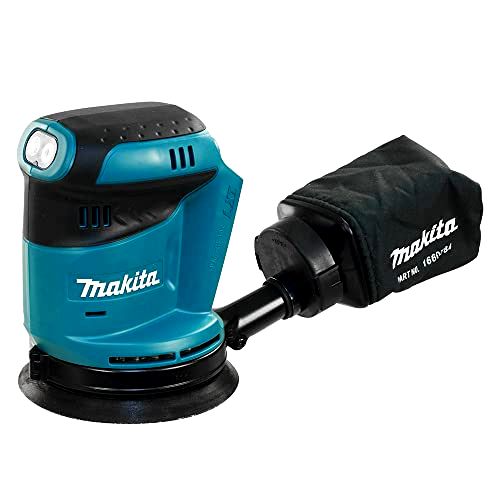
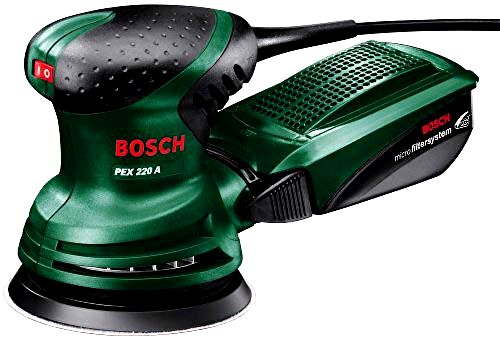
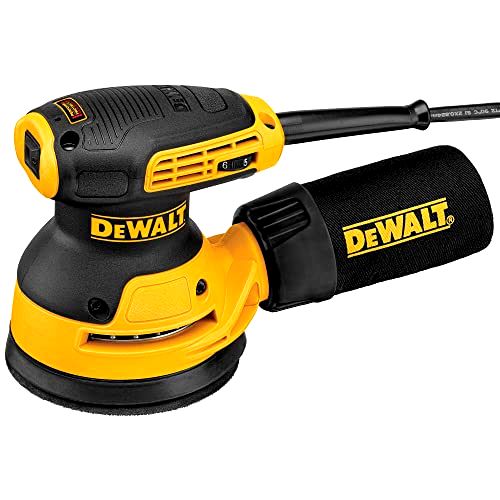
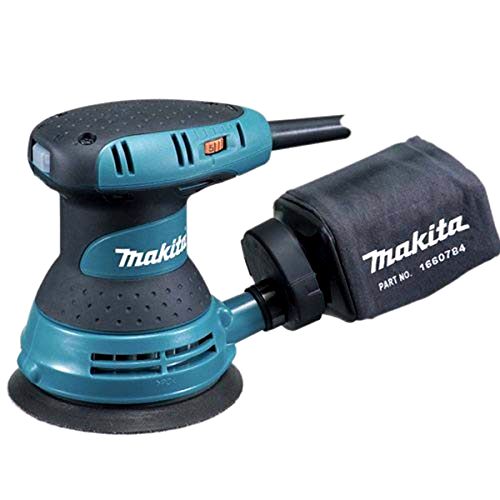
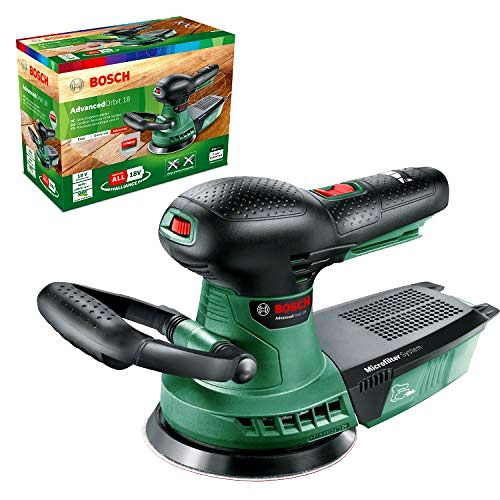
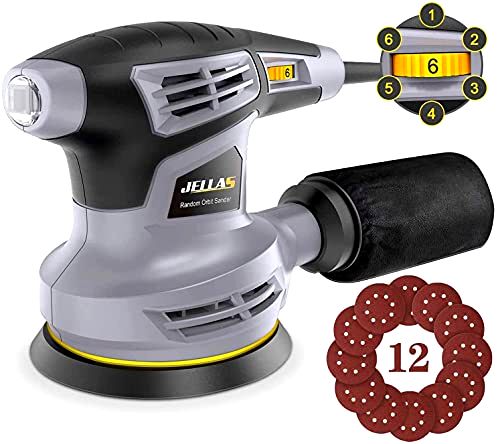
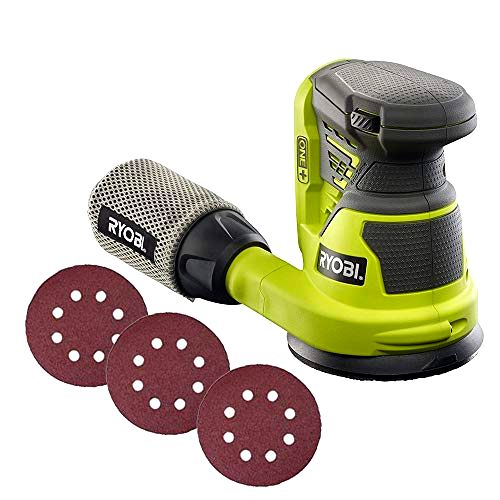
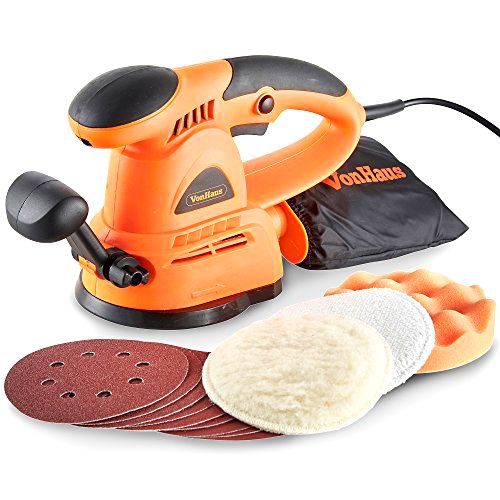

Share